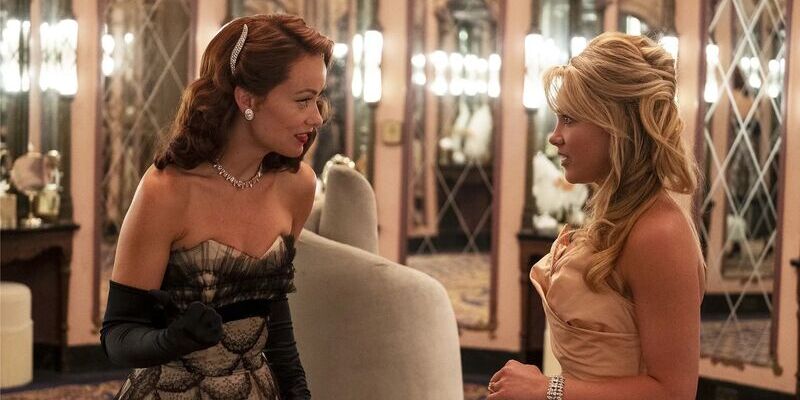
Review by
Eric Hillis
Directed by: Olivia Wilde
Starring: Florence Pugh, Harry Styles, Chris Pine, Olivia
Wilde, KiKi Layne, Nick Kroll, Gemma Chan

A troubled young woman ducks her head under the waterline of her bath.
The same woman looks in a bathroom mirror, but when she moves away her
reflection remains in place. Within a single scene of her second movie
as director, Olivia Wilde pulls off two of the most over-used
visual clichés of the last two decades.
Don't Worry Darling is so derivative that you'll find
yourself concluding that Wilde is either knowingly ripping off dozens of
other movies or she has never seen another movie in her life and
believes she's the first filmamker to employ these hackneyed
ideas.
The central premise is one that we've seen countless times in movies
and TV shows of the past couple of decades, though it has its roots in
1960s sci-fi TV. We open on what at first glance appears to be suburban
America in the 1950s. The fashion is from that era, as are the music,
the cars and the gender roles. But wait, there are inter-racial couples
and women walking around topless in public, so this clearly isn't really
1950s America. And what's with that character's terrible British accent?
He's obviously not really British, is he?
Don't Worry Darling is so predicated on its final act
twist, which every audience member will have guessed within the opening
five minutes, that the entire movie becomes redundant.

In this pseudo-Atomic Age milieu we find our heroine, twenty-something
housewife Alice Chambers (Florence Pugh). She and her husband
Jack (Harry Styles), he of the dodgy British accent, have
recently moved to Victory, a company town ostensibly isolated in the
California desert. The men claim to be working on the manufacture of
"progressive materials," but they're sworn to secrecy and can't divulge
the nature of their jobs to their wives, who don’t seem all that curious
anyway. When the men drive off to some sort of underground facility
every morning (the movie's most striking image is of dozens of 1950s
American cars making their way through the desert like a convoy from a
Mad Max movie), the women head into town to spend the day shopping,
practicing ballet and hanging out by the pool.
One wife, Margaret (KiKi Layne), appears to have a breakdown at
a gathering at the home of the company head, Frank (Chris Pine),
shouting about how something is wrong. Most dismiss her as suffering
from delusions, but it sparks something in Alice, who has been having
subliminal flashes of what looks like chorus girls in a Marilyn Manson
video.

The audience is always several steps ahead of Alice, not because Wilde
and screenwriter Katie Silberman have fashioned the narrative in
that way to mine Hitchcockian suspense, but because we've already seen
this story several times before, most recently in an episode of a hugely
popular sci-fi show. Alice's investigation into what's going on around
her isn't remotely interesting. At one point she just blurts out a
series of expository revelations, but we haven't seen any evidence of
how she might have come to those conclusions, as though a good chunk of
the second act was edited out to keep the running time down.
While Don’t Worry Darling is one of 2022's worst
films, it boasts one of the year's best performances courtesy of Pugh.
Somehow she manages to bring humanity to her flatly written and generic
heroine, and at times you momentarily forget how awful the movie she's
anchoring really is. And it really is awful. Wilde is lucky she has
clout as an actress, because if any woman director who didn't have
Wilde's background made a movie this bad their career would be over and
the film would be used as a cudgel to collectively beat women filmmakers
with.

[Spoilers begin] Okay, I need to get
into spoilers to discuss some of the reasons the film is terrible, so
you have been warned. As is obvious from the very first frames (and as
most of us guessed as soon as the trailer was released), Alice isn't
living in 1950s America at all, but rather she's stuck in a simulation
in the present day. It's revealed that Alice is actually a nurse in the
real world. She's married to Jack, except he's not a suave Brit but a
lank-haired American slacker who spends his time on the internet
listening to Frank, who it turns out is a Jordan Peterson-esque
figurehead for angry young misogynists. Frank has come up with a way for
men to return to the gender norms of the mid-20th century by entering a
virtual reality world, which begs the question of why guys who look like
Harry bloody Styles and Chris bloody Pine would need to take such
extreme measures to get laid? And why is the broke Jack selected for
this project, which surely would only be offered to the elites of the
world? Why is Jack made to pretend he's British when none of the other
men in the project are lumbered with such a burden? But the biggest
question is why the 1950s? Why would a bunch of men who spend all their
time on the internet openly choose to deny themselves the technological
advancements and resources of the last seven decades? Is a qualifier for
taking part a love of 1950s music? There are many other questions, like
why is Alice having her chorus girl flashbacks, why would Frank build
hints of the outside world like planes flying overhead into his
simulation, and what is the role of Frank's wife (Gemma Chan) in
all of this? But when it comes to Don’t Worry Darling, the biggest question is why does Wilde think none of us have seen
The Prisoner, The Truman Show, The Matrix, The Village, and most of all, the 'USS Callister' episode of
Black Mirror? [Spoilers end]

